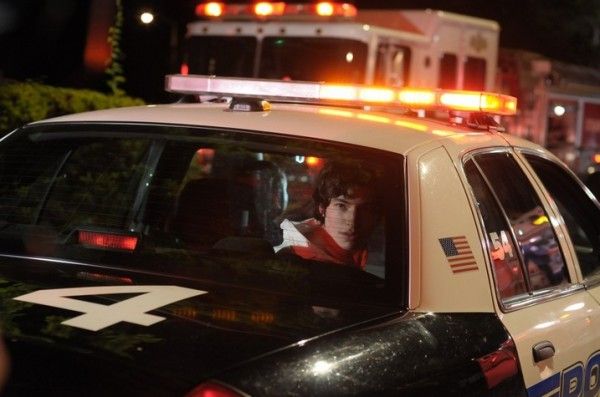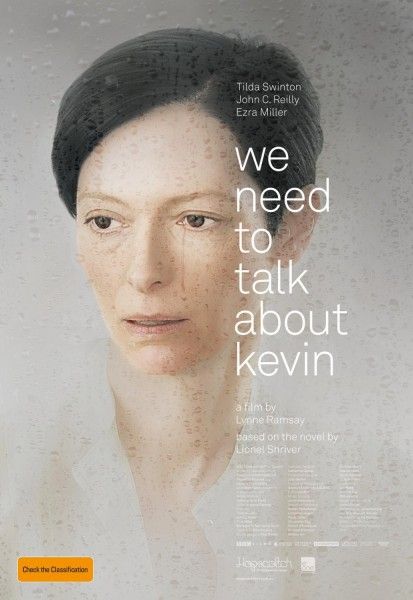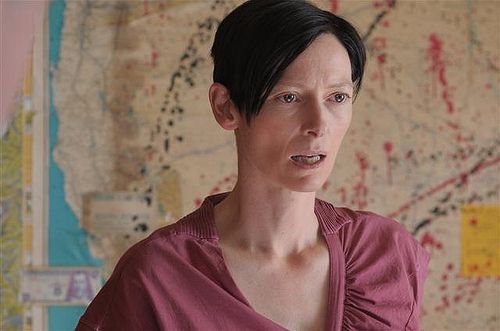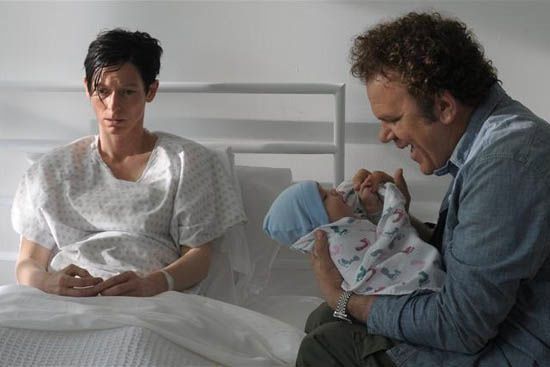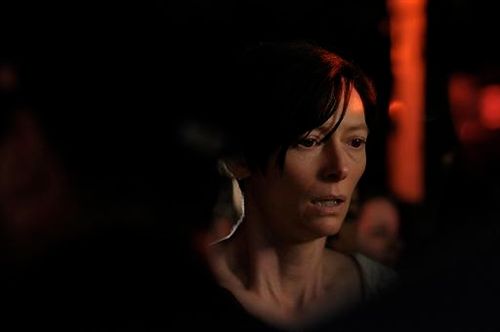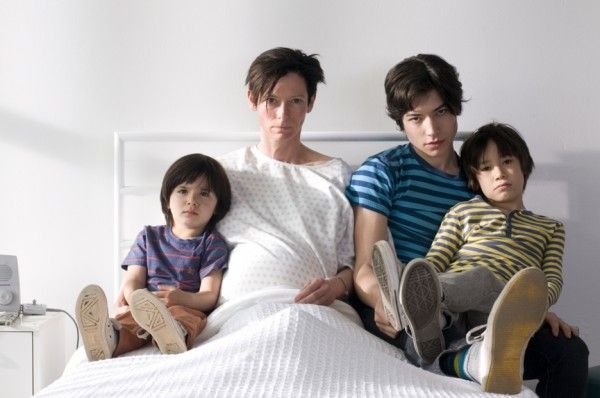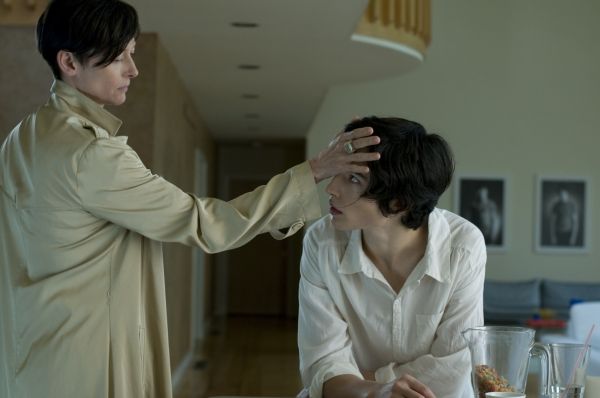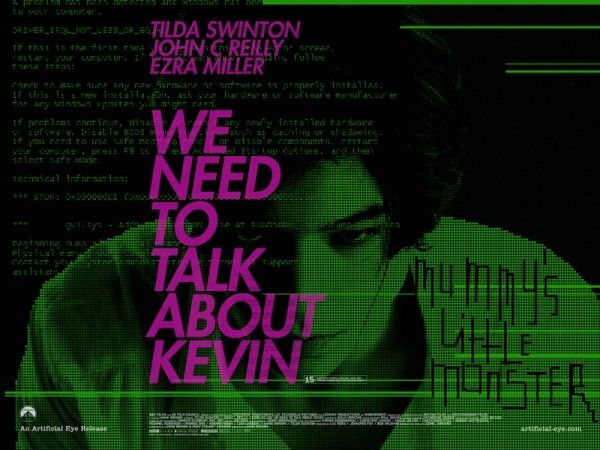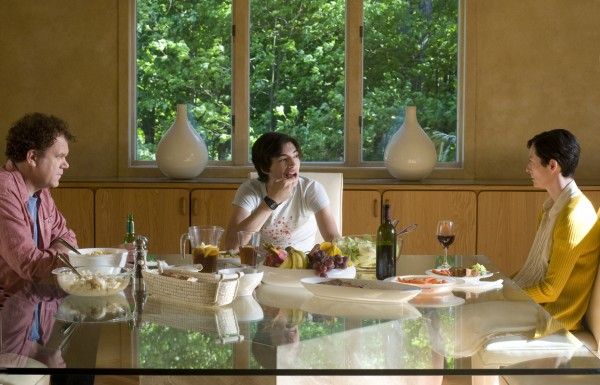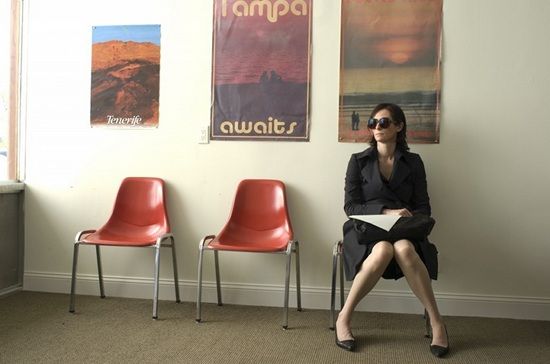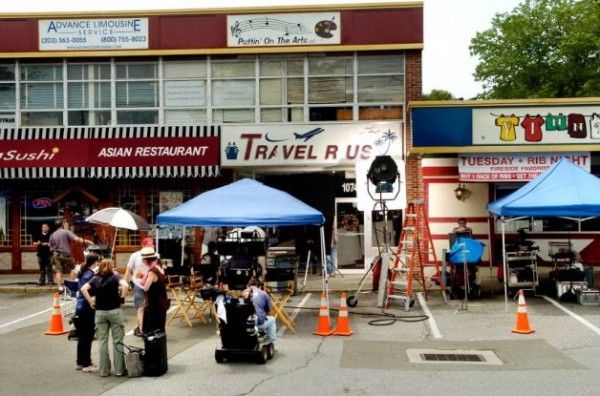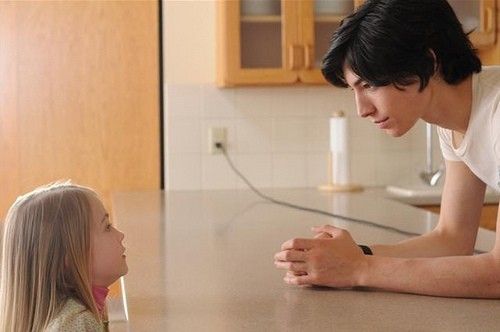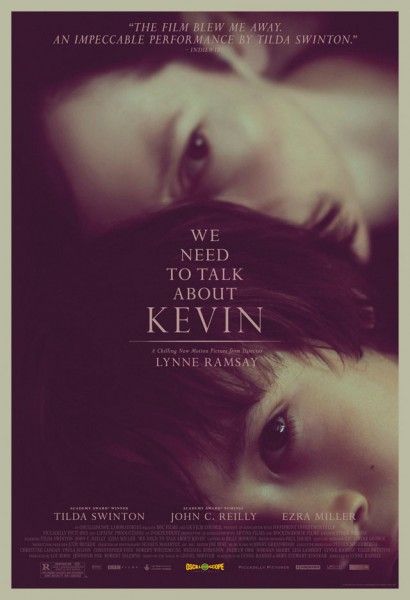We Need To Talk About Kevin has been gathering acclaim since its debut at last year's Cannes Film Festival. Lynne Ramsay's first film since her 2002 critical hit Morvern Callar, paints a claustrophobic nightmare for the mother of an evil son whose committed unspeakable acts.
The film begins a gradual, national rollout this weekend in New York as its star, Tilda Swinton is a Best Actress nominee (Motion Picture-Drama), across the country, at Sunday's Golden Globes in Beverly Hills. Ramsay's also seen her share of glory for Kevin, including a Best Director win at the British Independent Film Awards (England's equivalent of the Indie Spirits). The writer/director made time for Collider during a hectic press tour. Hit the jump for the transcription and audio of her interview about Kevin, including lots of exclusive details on why she probably won't give Patti Smith's autobiography a big screen treatment, other biopics of rock icons she's turned down and what she really thought of Peter Jackson's King Kong. Warning: Spoilers ahead.
Lynne Ramsay is the kind of person you want to have a beer with. She's funny and charming, without any hint of a filter. Her big-screen adaptation of Lionel Shriver's post-Columbine novel, We Need To Talk About Kevin, is similarly uninhibited. Hauntingly paced, with a jigsaw configuration of its timeline, the story follows Eva Khatchadourian (Tilda Swinton), a mother whose emotionally maimed by her evil offspring (portrayed at different ages by Rock Duer, Jasper Newell & Ezra Miller) before the teen enacts a devious plan for those around him.
Along with her husband/co-writer Rory Kinnear, Ramsay re-structured the novel, which is a series of letters from the mother, into a far more sympathetic portrait of a woman struggling with incredibly discomfiting questions of motherhood. After a false start with a major film studio, Ramsay got a budget together for a 30 day shoot with 25 setups per day and no more than three takes on any shot. It helped that she cast the Oscar-winning Swinton and Oscar-nominee John C. Reilly (Chicago) to headline the film with a chilling score from Radiohead's Jonny Greenwood (who is also responsible for the score of Paul Thomas Anderson's There Will Be Blood and upcoming The Master).
The Glasgow native is used to critical success. Despite submitting photographic stills in place of film work to the UK's National Film and Television School, she was accepted and moved from cinematography to direction. Her graduate film, Small Deaths, won the Cannes Prix du Jury for Best Short Film, as did her subsequent short Gasman, which also took home the Scottish BAFTA. Her feature debut, Ratcatcher, was released in 1999 to near-unanimous praise from critics who were impressed by her portrait of early-70s Glasgow. With BAFTA & BIFA wins for that film, she found increasing success with Morvern Callar, a character study featuring an acclaimed performance from Samantha Morton.
Ramsay was set to direct the feature film adaptation of The Lovely Bones, but was squeezed out, as the profile of Alice Sebold's novel skyrocketed thanks to a place on Oprah's Book Club. Peter Jackson took over and Ramsay moved on to the lengthy process of getting We Need To Talk About Kevin made. It's a process we tackled, along with several others, in our extensive talk.
We started, however, with her next film's very interesting log line, that she is already planning, as described immediately below. You can click here for the audio or read on, for the transcript.
Collider: It's a sci-fi Moby Dick meets Das Boot, in space?
Lynne Ramsay: (Laughs) Well, yeah, it's inspi- I, I mean, I think the (Herman) Melville novel is the true American classic. A lot of people haven't read it, 'cause it's, the whale chapters are pretty intense. I was trying to find a book that wasn't one of those crappy books, at the airport. You know, everything's like someone's biography, there was no classics and my husband (Kevin co-screenwriter Rory Kinnear) said, "Why don't you read this?" and so I start reading it on the plane and, I'm like, "Man, this is amazing." You know, the themes are amazing, and I said to him "Well, I can't make 'Moby Dick.' It's been made. John Huston made it (his 1956 version starred Gregory Peck as Capt. Ahab), but we kind of had a brainwave and we said, "Why don't we take it to space? But it's very much inspired by, rather than a traditional adaptation, because the themes, I think, are very, the man is a monster. The revenge themes are against an animal that doesn't understand. We're doing that right now to the world. Killing something for- and going on this mad mission and taking everyone to their certain death. I mean, I think the world's becoming like that, you know. So, you know, it ain't Star Trek! Put it that way. You know.
Will it be-
Ramsay: But I'm also making a short for the Olympics, which has sci-fi elements, as well.
Well, let's get to that in a second. Is it an alien that-
Ramsay: I'm designing an alien. It's several aliens, but they're different breeds.
Are you getting a sizable budget for this?
Ramsay: I'm developing it through the BBC and lots of people are interested to do it. So I don't know yet, we'll see. But, a lot of actors want to do it too, and, you know, I've made a lot of films low budget. I know how you make low budget. Kevin was shot in 30 days. So, I think it's a bit will to power. You know, if I want to make this, I'll find a way to make it. So, in this crazy world, there's not a lot of money and you know, we find a way, you know.
Well, I, the reason why I ask is because effects is a completely different thing where there are-
Ramsay: It will be in-camera effects only.
Wow. I want to see this, now.
Ramsay: (Laughing) Yeah, you see, I did a lot of work on opticals when I was at film school, so, you know, the old optical style.
Because you trained as a DP (Director of Photography).
Ramsay: And a photographer, as well. Yeah, but photography and DP-ing are very different. Um, photography's more like directing, it's more you choose your subject and you study your subject, so the first week of film school, I knew I was on the wrong course, 'cause I applied to the film school only with stills and I think I was the first person who, to go to film school with stills, with, just stills. They liked my stills. And a DP I worked with then, he loved my stills, as well, he said to me right away, even the head of film school, says, "You sound like a director." And I, I tried to leave but they didn't want me to leave, and then I wanted to move to documentary and, you know, somebody else moved to doc-, you know, they, they gave it to an editor, so I kind of ended up staying, kind of by default, you know, and directed my graduation film and shorts there, as well, so yes.
And this short film that you're working on for the Olympics. Did Danny Boyle (who also comes from the UK's independent film scene and is the Artistic Director of the Opening Ceremony for next summer's Olympic Games in London) get you involved? Or-
Ramsay: No. That was the BBC. They asked me. I have a good relationship with Christine Langan there. They did "Kevin." She's wonderful and, the (British) Film Council have been wonderful to me, and so, and it's a collaboration with Film 4 and the BBC and they wanted some art, you know, to pick some directors and artists who would, you know, contribute, yeah.
What's the short gonna be about?
Ramsay: It's about a swimmer who is like this alien cypher who basically swims through the whole of Britain, comes from the sea, swims through Britain. It's completely surrealist, um, and we see scenes from the bank (of the river), his total point of view, and so we just see this guy day and night, and the painful journey. It's quite a spiritual film, actually. After Kevin, I needed some palate cleanser! (Laughs)
Yeah.
Ramsay: After a total Rubik's Cube, puzzle, I'm now doing 6 minute long tracking shots. You know? (Laughs)
Is the entire film a-
Ramsay: Tracking shot.
In the full, and the full thing is that 6 minutes, so-
Ramsay: Well, no, but every shot in the film is a tracking shot that lasts quite a long time but there's one shot in particular, which is, the boy, 'cause it's cold water swimming. We did it in November. It's nearly; I think it was 6 degrees. He-
Ramsay: No, it was in all the rivers down, near Devon-
Oh, ok.
Ramsay: -which is south, but, that kind of swimming is a really particular swimming, you have to train in a different way. He's an Olympic swimmer, but you have to assimilate and get your body right, and it's really tough. It's pain. It's total pain. You're going through this freezing water. Your head starts to buzz. You start to hallucinate. You know? So, the poor kid, man. I hope he's ok! (Laughs) He was gettin' really white by the end, so (Laughs) but he's a, he- I think I discovered an amazing actor, as well as a swimmer, because if you have an athlete, you're really focused and he's been training for six hours every day and someone tells him to lift his arm a little bit higher (Ramsay lifts her arm to simulate a lesson, mid-swim stroke). I mean, imagine directing a kid like that. I say, "Do this, do that." He does exactly what I ask. It's amazing. I'm gonna work with some athletes from now on (Laughs), as well as actors, you know?
But you've worked with a lot of non-professional actors before, though, in your shorts, as well, yeah.
Ramsay: Yeah, yeah, yeah, yeah. I quite, I like to mix it up a bit. Keeps the actors on their toes and also, it's really interesting, because you have a new freshness.
Does your-
Ramsay: Although (Kevin star) Tilda Swinton's not like an act-, I mean, (star of Ramsay's Morvern Callar) Samantha Morton's not. I wouldn't say they even consider themselves actresses. Samantha Morton just went in on Morvern Callar and she was Morvern Callar for the whole movie. I just followed her, really. Shooting mags and mags and, you know, 10 minute reels and, she was just in character and Tilda's just, brings it all in, man. She just, she's no bulls--t. She comes- she's aristocracy, Scottish aristocracy. She comes from a military background and I think that helps. She's just, like, "Get. The s--t. Done." Yeah, and she- and I love her.
The last thing on the Olympics short.
Ramsay: Mmhmm.
Is that gonna be played at the Opening Ceremony?
Ramsay: We d-, I don't really know, yet. I think they're going to screen them and they're gonna be shown at the ceremonies, but this is a little bit gray at the moment 'cause I think some people are still, you know, still making them. They don't need to be delivered until March, but I started shooting it and then I thought, I could've made this a feature, you know! It's crazy. It was, it wasn't my-
Would it be a seed for a feature?
Ramsay: Yeah, I might use it. It's a, it gave me lots of ideas and I worked with a wonderful DOP who is 5-foot-2. She's a diver. (Smiling as she recalls the shoot). We did the biggest crane shot. We had all the big toys and me and her, like, we're tiny and she is really fearless and I, I, I really want to work with her again. Same as (Kevin cinematographer) Seamus (McGarvey), and same as Alwin (Kuchler, who was main DP on Ramsay's 3 short films & first 2 features) and same as (Ramsay's DP from one sequence of her short film Kill The Day) Tom Townend who shot the, the opening scene, the Tomatina (tomato festival in Spain). The Toma-
Yes.
Ramsay: That's another DOP. I think (the main Kevin DP) Seamus (McGarvey) wanted to kill him, because HE wanted to shoot that (Laughing). You know?
Why didn't he?
Ramsay: 'Cause he was on a different film. You know, he was already booked. I was asked by the producers, recreate it up here. And I said, "No way." I mean, it would cost millions of dollars. I mean, it's 40,000 people on a tiny little street covered with tomatoes, I mean, that, I know, it happens for two, a few hours, we had no time to shoot it.
What did you have, 15 minutes, right?
Ramsay: Man, it was crazy and I, I- but basically, I picked a sweet spot. I went really early and I said to Tilda, "Keep the day free." We went, we picked a sweet spot and then, a Bollywood film who'd also tried to recreate it, there's no way you can recreate it, but they had a lot of money. They saw that I had the good spot, you know, and they went higher. Tried to get my spot, and I was like, "No way." You know, but thank God for Tilda Swinton. She went into this mass of drunken boys and girls and got smacked in the face several times. I was pulling bodies out. It felt dangerous, but sexy and, I mean, the first thing that happened to me, someone put a bucket of tomatoes over me and the, the camera got jammed and I told Tilda to stay back and we had to wait for it to calm down a little bit but then they clean it really quickly. They come with big hoses. So, you've only got a little window, but it gets pretty crazy. You know? I mean, these guys have been standing, drinking since 7:00 in the morning, and what they do, in the beginning, to start the ceremony is, um, they've got a big pole, with a ham, it's, it's an animal or something and, it's covered with grease, like lard or something and the person that gets the ham, and they all try to climb over each other. It's very sexual, and then, they get the ham and then they fire a big gun and then, everyone goes crazy. Like, (Laughs) it's just totally mental, you know? It's so- it was my, my husband showed me some pictures online, that's what gave me the idea. 'Cause I said, "Don't, don't you always end up on the bleedin' internet. Get off that computer. You're too plugged in." And then, I see this and I went, "Oh, ok. That's cool, you know." So-
But you talked about the personal toll that doing this film took, emotionally.
Ramsay: My dad was dying and someone got a hold of a leaked out copy of the script and really liked it. This company that did Twilight. Summit. They're a serious company and I got a phone call the day my dad died from the BBC saying, "You know, you've been offered £12 million to do this and, they seem serious. You don't even need a big actress and she was really happy and I said, "Well, you know, my dad's just died, you know? And so I was distracted. They danced around it for a year, and I- You know, it was an early draft and I wanted to do, make it really, you know, intricate and so, the recession happened JUST before I came to New York to cast. So, I met (eventual Kevin star) Ezra (Miller) when he was 15 and then the whole thing fell through and I was really angry with them because I knew I could've went to the (UK) Film Council in the first place and that, that's what I had said to the producers, in the first place, is, like, go to the Film Council. Let's do it independent. You know? And I felt like, it was a lovely guy, Lenny Crooks; he kept some money for me. Like a million? You know? He's a good guy. And he supported me as a filmmaker. And so it's such a shame about the Film Council (being closed due to UK government budget cuts), but hopefully the BFI (British Film Institute), hopefully it's gonna be ok. I just hope that new filmmakers get a chance.
Yeah.
Ramsay: 'Cause I've been lucky. I got some, you know, funding from the government, you know? And you don't have that here. I don't know how you guys make movies, then. I mean, especially if you don't have a lot of money. I'm a blue collar Glasgow (Scotland) girl. You know, you need to have rich parents or a sponsor or- People think 'cause of You-, it's a digital world, that we shoot a film for nothing, but you meet all these young filmmakers doing amazing work and they're working in a bar or the cleaners, or, you know?
Well, it's similar to that scene in Quills where the Marquis (De Sade) gets put in (prison) with nothing, and he cuts himself so that he can write (on his bed sheets) with his blood?
Ramsay: Exactly. Exactly.
You have to do it, and you will.
Ramsay: Yeah, yeah. I, I'm quite fascinated with the Marquis de Sade, actually! (Laughs) But also his book. Fucking crazy, man. You know?
Would you ever make a film about Marquis de Sade?
Ramsay: I'd like to make a film about (atom bomb pioneer & head of the famed Manhattan Project J. Robert) Oppenheimer, actually. But, I don't like biopics very much. I've been asked to do quite a few. But I was reading the, the (2005 biography) "American Prometheus: (The Triumph and Tragedy of J. Robert Oppenheimer by Kai Bird and Martin J. Sherwin. It was a book I bought for the plane and I left it on the plane and I'm really annoyed I left it on the plane, 'cause it's about Oppenheimer and he's a beautiful man, of real vision and, how that vision becomes skewed and, the McCarthyism and all that sort of stuff.
Wait, what biopics have you turned down?
Ramsay: Uh, I was asked to do something on Blondie, which- I love Blondie. I absolutely love Blondie and then this, Patti Smith's done a lovely, wonderful novel, and that's about Robert Mapplethorpe and that friendship. I love that. 'Cause I'm a photographer, I saw, like, his work very early on and it's very provocative and, some of it, I don't know if I like it, but it certainly gets something and that was another one that I thought about, but, I mean, the one I think that works the best that I've seen is Control (Anton Corbijn's 2007 film about the tragic life of Joy Division's lead singer Ian Curtis). You know, and Samantha (Morton) is wonderful in that. I mean, man she's amazing and the guy in it is amazing. (Sam Riley portrays Curtis and will play Sal Paradise in 2012's long-awaited screen adaptation of Jack Kerouac's book On The Road). But that's a different, it's not a biopic really. It's just, you're kind of in his head, but sometimes, you know, there's kind of a lazy biopic here to, tells you something and it's boring and like, or it presses all the buttons, but it doesn't really tell a story of the person from a very subjective point of view. But someone like Oppenheimer I think's really interesting. I'd love to do that. Yeah.
Have you approached other people about it?
Ramsay: No! I just got it. You're the first person I've told!
Oh, yeah?
Ramsay: Another one I love, American novel I love, is What Makes Sammy Run? That is super, man. That's been in development for f-, years, man.
[Ed. note: It was made as a TV film in 1959 with Larry Blyden , John Forsythe of Dynasty fame, Barbara Rush from Peyton Place, Dina Merrill and Norman Fell. Ben Stiller has reportedly been closest to making Budd Schulberg's 1941 satirical novel of Hollywood moguls at several points over the past 15 years].
Well, it's been in turnaround, I'm sure a number of times.
Ramsay: Every filmmaker-
Yeah.
Ramsay: The same with Seconds (John Frankenheimer's 1966 sci-fi thriller with Rock Hudson about a man who tries to start over by faking his death, changing his face and getting a new identity), a wonderful film. There's been several people trying to remake it. But, these things get shelved and then, they cost so much money in the development that no one can make them anymore, which is completely weird and obscene, you know? 'Cause, you know, it, it costs $2-5 million to develop it. You need to pick up that cost. You know, so…
Yeah. Have you talked to Patti Smith about doing (the film adaptation of her book)?
Ramsay: I like to meet her but, you know, the thing is that she's writing the script, (and I'm) totally respectful of that, and I think she wants to be protective of it and I would be, too.
Were you, you were approached about making the film?
Ramsay: Yeah.
Were you approached about Patti Smith, as well?
Ramsay: Well, the book had come out and a producer, a lovely producer, sent it to me, and I did think about it, but I thought that Patti should do it hers-, I mean, I don't want to make people feel, I'm gonna do it, but I studied photography. I mean, man, these were things I knew about and I am, I’m really fascinated by photographers, and, and also the relationship (Mapplethorpe and Smith) have. He's a gay man and she, you know, she loves (him). And so, it's a beautiful story, but I think it's best she does it herself. She should direct it. Yeah.
As I was watching "Kevin," I couldn't stop thinking about Jeff Hall. (60 Minutes profiled the neo-Nazi leader murdered by his 10-year old son in California, as he slept. The investigation found that the boy's violence did not stem from the Nazi views and active beliefs, but the boy's own innate emotional issues)
Ramsay: Ohhhh…
The neo-Nazi. His son, who shot him, the cops who, who looked at it, said, well, before his father turned into a neo-Nazi, (his son Joseph) had been kicked out of several schools. He had tried to choke out a teacher with a phone cord.
Ramsay: Yeah, yeah.
-he would have done something like this, over time-
Ramsay: Anyway.
It was just that-
Ramsay: It was a time bomb.
It was the match. And, in this, and I think it's less accusatory than the novel (We Need To Talk About Kevin) is.
Ramsay: Definitely.
It seems like the nature of evil is that, it IS (it just simply exists, without cause). There are moments, several times, in the dialogue where they talk about, you know, why (does he do these things)? (He responds) "Well, there is no reason, well, you know, with the computer virus (that he sets up on his mother's computer), it just IS." Things are-
Ramsay: Well, I just read, a, another biography of (legendary Chinese leader) Mao (Tse-Tung). You know? And he was a psychopath, and people loved him, too, so and, I don't want to insult any of the Chinese people, of course. But, there was a lot of people, there was BILLIONS of people killed (smiling in awe of the horror). You know, and you realize this guy who had a really nice mom and dad, a nice family, I mean, sometimes, you know, there's not a reason. You know? I mean, people want to find easy answers, like: "Who's to blame (for) the Empire of Evil?" Evil begets evil.
Well, just like people will, will see King Kong and they have a million different meanings of what it's actually about.
Ramsay: Yeah, yeah, yeah.
Or, Robert Shaye-
Ramsay: It's a brilliant film, actually. The original, anyway.
Yeah, the '33 (film). Yeah. We won't talk about- I know the troubles that you've had with Peter Jackson.
Ramsay: No, actually Peter Jackson's a great filmmaker. I've got nothing against Peter Jackson.
Did you like that new King Kong (that Jackson directed)?
Ramsay: I, no, not as much as the original, no.
Yeah. Yeah.
Ramsay: I get a bit sick over the CGI and all these motion capture- and all that money spent. It feels a bit gross. In fact, I get a bit bored with 'em. You know?
Yeah, but people have a million different explanations for what it's about and (former New Line exec) Bob Shaye was talking about The Lord Of The Rings and he said that somebody came up (to him) very earnestly, and said "it's all about the power of nuclear weapons." (Ramsay laughs to the point of coughing) And, and justified it the entire way.
Ramsay: Wow! That's kind of cool. Wow!! That's cool. All right! That's mental! Som-, Someone came to me at Ratcatcher and said that, "That's a film about Jesus Christ. You made a film about Jesus Christ. It's all the kids (are) Jesus and I'm like, "Dude, really?" I mean I wasn't really conscious of that, at the time, you know-
Well, with Kevin, what would you say that it's ultimately about, if not about the parental relationship, (but) on a bigger scale?
Ramsay: Well, a bigger scale? It's about the unexplainable. That sometimes evil comes from some, you know, somewhere unexplained. Some, I, I think that there's a need for love there, and she's not a natural mother. I'm not saying that she's to blame because of that, but it's a pretty taboo subject when you know that. The way that Tilda (Swinton) even held the child. (At arms length during one scene) You know? It was, you know, it's at arms length. And the first three months are really important. The kid picks up on all that stuff. If you don't teach a kid language, they can never ever; feral kids can never learn to speak. Honestly, I saw a documentary, man. If you, they found some feral kids, they're trying to re-speak, uh, if you don't learn speech at a very early age, you can never learn it. You know, so those formative years are really a big deal. You know? And I think, so I think she's pretty resentful as a mother, but I think he's also got an emotional quotient missing. And they're at a kind of war, you know? I guess it's a kind of domestic horror film or, but no, I wasn't trying to make it a High School killing movie. I was trying to make a mother-son, I was trying to make, I suppose it was Oedipus (Rex), or something. It was like, a modern Greek tragedy, you know. That's where the political thing might come in. You know, so, yeah.
Yeah, but I was actually wondering:
Ramsay: Elephant does a good job of making that film, about that, already. You know, and the film before that, Elephant, was Alan Clarke (a 1989 short film about violence in Northern Ireland without depicting who was responsible), which was a short film about violence. You should watch it. It's just; the whole film is tracking shots. One guys shoots another guy.
Yeah.
Ramsay: Then he shoots another guy. And then he shoots another guy, and mindless violence. On and on and on and on. 'Til you become f---ing anesthetized and it's a terrific movie. I mean, you're, you get, bored. I mean, it's crazy! You're watching this thing (and) it becomes miasmatic. Just the people are shooting each other. And then you see these things; I mean I saw this thing online. I mean, these, these kids who play these shoot 'em up games. And they go to war. I saw something that was so upsetting to me. Two boys that, soldiers, you know, seemed like nice kids and, now they have these targets they can do in Iraq from, like, you know, like, a mile away.
Drones. Yeah.
Ramsay: I think they saw a guy who (had) a bag who was a journalist and they just shot them and, you see the footage from the ground. It's really disturbing, and these guys were like, yeah, go, yea! Yeah, it's a video game. That's mindless violence if it, there ever was. Then, you saw the footage on the ground of the people burning. They don't even know, or relate to that, those people, in a human way. Yeah, now that's pretty sociopathic or psychopathic, if you ask me.
Yeah, yeah. When you heard about Columbine, did you think about the, the mother? Before you had read this book?
Ramsay: Well, I thought about the mothers of Hitler and Mao and, and people of that. You know? And-
I mean before you got the novel.
Ramsay: Yeah! Before that and obviously, there was a big massacre in Scotland, too, called Dunblane. [Note: In May, 1996, an 43-year old unemployed former shopkeeper went to a school gym and randomly shot and killed 16 five and six year-old children and their teacher, before taking his own life] One guy, yeah, he gets a gun and starts shooting everybody. It was just rage. There's a lot of rage in the world. They're little time bombs. You know, so...
What does it say, that the only person to actually ask her how she's doing is one of the victims, in the film?
Ramsay: Well, I don't even think that scene's in the book (by Lionel Shriver). Me and my husband (co-writer Rory Kinnear) made that up. You know? I mean, I think there was something similar. You know, and (author) Lionel (Shriver) was really cool. I mean, she let me take a lot of liberties and stuff and, and she never saw the script, at all, until the end. But yeah, we just- I suppose it was like, something very powerful about kindness from the person that was inflicted, 'cause he didn't blame her. He didn't say (you're the) cause of Kevin, you're Kevin. He saw beyond that, you know. And, and I thought that was very moving. Yeah.
Well, 'cause it's a, it's a monster movie.
Ramsay: Yes. Yeah.
Ramsay: Wait 'till you see my modern Frankenstein. That's coming up. (Laughs)
Are you? Are you working on a- (Taking a sip, Ramsay nods) Is that-
Ramsay: But it's not old-fashioned. It's modern. Yeah, yeah. But I said, it's a different idea. It's just that I get inspired with it.
Is that gonna come after the sci-fi film?
Ramsay: It's something boiling, but it's not anything like, what, what you'd imagine Frankenstein to be. It's modern day and, ahhh, I can't say too much, quite yet. (Laughs)
Well, very much like Frankenstein is a monster movie in two parts in that it's about a monster, but it's also about the monster of society coming after him and you have children cornering (Swinton's character in Kevin) in her house and you also, the reason why I was asking about the victim being the only one to ask her how she's doing is because there's so often, people act on behalf of victims and are outraged on behalf of victims-
Ramsay: Yeah, exactly! Exactly. That's a really good point. People want someone to blame and, you know, they take up a cause, you know, and actually, if you look at-
But they have absolutely no connection to it, whatsoever.
Ramsay: Yeah! And I read something very recently about, I don't remember the names, but it was a man, his daughter or his son had been murdered, and, and all these people took a cause and the murderer was going to be executed, quite rightly, 'cause it was quite horrific, and he started to change his mind about capital punishment, the dad. And I thought, oh my god, he started campaigning the other way and I'm like, that's…
Where was this case?
Ramsay: I think it was the US. It was the US, yeah, yeah. But, I read it in the newspaper, but I'm so spaced out right now, I'm like, I've read, I don't know where I am, what hotel room I am, 'cause I've been in so many hotels for the last six weeks, you know, so you know.
You talk about this press trip. Do you, as you're making the film, do you store away things to talk about during a press tour?"
Ramsay: Never, never! I hate talking about films I've made. I want people to see them. That's why I'm a film-MAKER. I, I think there's too much talking about making, you, you know, this, because there's the internet now, it's like, everyone wants a little angle. No, no offense, 'cause you're a great interviewer. But, it's like, you know, you, you talk about the same thing over and over again. It's not creative for me anymore. You know, I want to make another movie.
Do you do commentary tracks on your DVDs? I know Larry Clark doesn't.
Ramsay: I don't like to. I've done it once and I really hated it and I'm not gonna do it. No way.
Especially for a film like Kevin, where-
Ramsay: No. Why should I? Why am I gonna explain things. What I will do is I will talk about some processes and I will show some paintings that I did very early, of Kevin inside (the womb). I did little computer drawings about "angry Kevin" and moms with babies and the way she held him, so I can show some things to inspire filmmakers and new filmmakers, but I'm not gonna do commentary, no. No.
Mmhmm. We'll finish up with the advice for filmmakers (Ramsay laughs) because you had $7 or 8 million to make a film that should have been much more (in budget).
Ramsay: Well, it looks a lot more.
It looks a lot more. No, exactly.
Ramsay: And that's still a lot of money. I mean, most filmmakers don't even get-, I mean, first timers are doing it for $20,000 or, you know? So-
But for example, you had a problem, with, with brands [Note: many major consumer brands refused to let their logos appear in the film because of the controversial subject matter]. And I actually thought this was a conscious choice, that with all this inner turmoil, that she has and she's walking through this town with very generic brand signs on stores and in the supermarket, they're very generic, except for the, the very nice little placement of Mrs. Rosemary's.
Ramsay: That's actually, no it says. You know what it does say is, and this wasn't me because I, I don't like the kind of in-house jokes, but, actually, it's "Ma Ramsey's" but she spelled my name wrong. The designer, 'cause we couldn't use f---ing Coke, we couldn't use Campbell's Soup cans. We got- I mean, we live in a world where we see these things and I can't show them. So it was quite fun designing labels. It was like- I had got to de-, design pop art labels, but if you look closely, it's actually "Ma Ramsey's" spelled wrong. (Laughs hard) It's R-a-m-s-e-y, rather than, s-a-y. And when she showed me, at first, I was kind of mad. I went, I don't know if I want it to be this, but actually, "Ma Ramsey's" sounds like a soup can. You know? So-
Well, it came off like, Rosemary, like Rosemary's Baby.
Ramsay: Oh no! That's so cool!
That's what I thought that it, that's what I thought that it was.
Ramsay: No, no, no! It's Ma Ramsey's! (Laughs)
Ma Ramsey.
Ramsay: Like, at 1:00 in the morning, You know, and we were like, "What the f---?" And there's a, there's a soup can with a Scottish label called "Granny Smith?" Yeah, and I said, call it "Granny" something or Ma something and she went, "Ma Ramsey." So, that's how that happened. You know, we were, we were rather tired. (Laughs).
But, what advice would you have for younger filmmakers who are working with,
Ramsay: Stick-
-with limited budgets?
Ramsay: Yes, well, in this area. Don't try and change things for other people. Don't try and be persuaded by producers and people to change your vision. If you stick to your vision and you're true to yourself, it kind of works. I mean, it's tough. It's a big Fitzcarraldo journey (Werner Herzog's 1982 award-winning film about a man who tries to build an opera house in a jungle, that led to legendary stories during filming of Herzog having a 300+ ton ship moved over a hill without any special effects and a notoriously difficult star, Klaus Kinski, that Herzog had reportedly held a gun on during the filming of 1972's Aguirre, Wrath of God) but then, you'll have your good karma at the end of the day. You'll have your good soul. You know, if you start to sell little bits of it, you, you become nothing and nobody, and you don't have any vision (remaining).
And hopefully, you don't have too many Klaus Kinskis.
Ramsay: (Smiling) No! Although, I'd love to meet him. I've met a few, like that, in my time. I tell you. Samantha Morton's not far off! (Laughs) But in the most beautiful possible way. I love her very much. Yeah, yeah, but she's Klaus Kinski, she's crazy! (Laughs hard)

